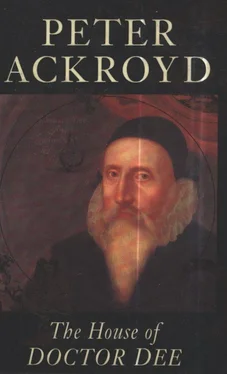Peter Ackroyd - The house of Doctor Dee
Здесь есть возможность читать онлайн «Peter Ackroyd - The house of Doctor Dee» весь текст электронной книги совершенно бесплатно (целиком полную версию без сокращений). В некоторых случаях можно слушать аудио, скачать через торрент в формате fb2 и присутствует краткое содержание. Город: London, Год выпуска: 1993, ISBN: 1993, Жанр: Историческая проза, на английском языке. Описание произведения, (предисловие) а так же отзывы посетителей доступны на портале библиотеки ЛибКат.
- Название:The house of Doctor Dee
- Автор:
- Жанр:
- Год:1993
- Город:London
- ISBN:9780241125007
- Рейтинг книги:5 / 5. Голосов: 1
-
Избранное:Добавить в избранное
- Отзывы:
-
Ваша оценка:
- 100
- 1
- 2
- 3
- 4
- 5
The house of Doctor Dee: краткое содержание, описание и аннотация
Предлагаем к чтению аннотацию, описание, краткое содержание или предисловие (зависит от того, что написал сам автор книги «The house of Doctor Dee»). Если вы не нашли необходимую информацию о книге — напишите в комментариях, мы постараемся отыскать её.
The house of Doctor Dee — читать онлайн бесплатно полную книгу (весь текст) целиком
Ниже представлен текст книги, разбитый по страницам. Система сохранения места последней прочитанной страницы, позволяет с удобством читать онлайн бесплатно книгу «The house of Doctor Dee», без необходимости каждый раз заново искать на чём Вы остановились. Поставьте закладку, и сможете в любой момент перейти на страницу, на которой закончили чтение.
Интервал:
Закладка:
FOUR
THE GARDENER FOUND the small bones. He had arrived to clean up the ground in front of the house and, although it was early in the morning, I thought I could smell drink upon his breath. He was wearing the headphones of a Walkman, and seemed to be swaying to some insistent tune. So I watched him as he set to work among the weeds and bushes; he was no more than middle-aged but he seemed very feeble, and immediately I regretted hiring him. The weeds defeated him, and he was bent over one patch of ground with a spade in his hand for several minutes. Then he began to examine the stone path tentatively and cautiously, as if it were about to collapse beneath his feet, before turning his attention to an area of tall grass. He was digging at its roots, without very much success, when suddenly he slipped and fell forward. I could see no other movement, so I hurried outside: he was sprawled inside a small pit which had been dug between some bushes but, more curiously, he had disturbed a ring of bones which had been neatly placed at the bottom of it.
'That's a very unusual thing,' he said, quite unperturbed by his fall. 'To see bones like that.'
My first sensation was that they were the remains of a child, and I looked at him in horror. 'What do you think they could be?'
'A dog. A cat. Some damn thing like that.' He picked up one of the bones and handed it to me; it felt oddly soft and pliable and I was tempted to put it up to my face, when I saw something gleaming by the side of the pit. It was a glass tube, snapped in half, and I recognized it at once: it was the same as the glass I had found in the drawer, with the odd distortion or protuberance at the end. But it had broken so neatly, as if something had been carefully poured on to the ground.
I went back into the house, and opened the table beneath the window in the ground-floor room; the glass tube was no longer in the drawer. I looked more carefully, letting my hand slide over the dusty wooden interior, when I felt something yield to my touch. Some sheets of paper had been laid here. When I removed them I saw that on the first of them had been written, in crude capitals, DOCTOR DEE'S RECIPE. I stared at the words in surprise: here was the strangest proof of what I had discovered yesterday, and the identity of the one who came before me in this house was now unexpectedly confirmed. But what kind of 'recipe' was this?
So that it may grow without the help of any womb! This is the secret of all secrets, and must remain so until that time of the end when all secrets will be revealed. Let the spagyricus take the seed and place it within a sealed glass, for preference the glass of Antwerp in which all light and heat seem to prosper. Bury it within horse dung for the next forty days, together with four true magnets in the shape of a cross, without forgetting to renew the water within the glass by pouring in the liquid of fresh dew each fourth day; then on the forty-first day it will begin to breathe and move its limbs. It will seem to you like a perfect human shape, but transparent and without any eyes. Now it must imbibe arcanum sanguinis hominis for the space of one year, all the while remaining beneath the glass, and at the end of that time it will be a pretty little infant thing. It will be a true homunculus, therefore, and can be taught like any other child; it will grow and prosper with all its intellect and faculties, until its thirtieth year when it will fall asleep and return to its first unformed state. One of the generation of the Inspirati must then cherish it, and place it again within glass, so that this secret and wonderful being may grow once again and walk upon the world. If you speak to it the sacred words it will prophesy about future events most cunningly, but its chief glory is that with proper care and reverence it will be constantly regenerated and so live for ever.
I looked up, and through the window glimpsed the clouds passing across the house. They formed such strange shapes that for a moment I thought I saw my own face among them; but the vision faded, and I looked down again at the papers I held in my hand. How could such things be? Margaret Lucas had told me that Doctor Dee practised black magic, but this was some monstrous fantasy. To create an artificial life within a tube of glass… I turned to the next sheet of paper, and then saw this.
PASSAGES IN ITS LIFE
It survived the Black Death by taking a compound of tannic acid, which it mixed instinctively. It prophesied the Great Fire, though no one listened. Dogs barked at its coming, and horses were afraid, but nothing else in nature recognized it for what it was. Yet it was loved by cats.
It knew Isaac Newton, and they held many learned conferences in which it explained to him the scientific meaning of the kabbalah. It was present at Newton's death, and was the thing which placed the coins upon his eyes.
It joined the Royal Society, and did several notable experiments upon the functions of the lymph gland.
It created the air pump, and then wrote in its pocket-book: Only our visions give us away.
It was employed in a glassworks, in Holborn, making lenses for the Greenwich Observatory.
It was once attacked by a London mob, which from its pale complexion thought it was a Huguenot.
It was a teacher at St Mary's Infant School in Walthamstow when it was first opened in 1824. Here it made a model of Trevithick's steam locomotive, to the great delight of the children. In the company of young people its natural colour was a light pink, which was ascribed by the other teachers to rapid circulation of the blood.
It has worked in the sewers beneath London.
It looked after Charles Babbage from his infancy, knowing him to hold the key to future prosperity.
It loved to walk among the New Docks at Wapping where there was an iron swing-bridge.
It worked on radar during the Second World War.
It travelled to the moon.
There are times when it leads an ordinary life in the world, without knowing anything of its destiny, but then by accident it causes wonders. It is such a loving subject that it helps others to find their true genius. It remembers nothing about its past or future until it returns home at the end of its thirty years, but it always does return home.
It has a doctrine — it believes in progress and the perfectibility of man. That is why, in the presence of superstitious people, it changes from white to red.
This is its vision of the future. It knows that contemporary science will develop so far that it will return to its origins, purified, and then expound the mysteries of the past. The doctrines of the alchemists and the astrologers, whom the homunculus knew very well, will then be revived within the great vision of quantum theory.
It knew Galen, and says that his beliefs were essentially correct. The doctrine of the humours will therefore be revived. The homunculus further tells us that the theory of the four elements is also accurate in a spiritual sense and will one day be employed by theoretical physicists.
It has one great fear. If the cycle of the ages is not mastered by great scientists, then the end of time (which it prophesies for the year 2365) will be reversed. It knows then that the centuries will roll back and that humankind will return in stages to its beginning. The Victorian and Elizabethan periods will recur, and Rome will rise again before crumbling into the darkness of what we now call pre-history.
I had read enough, but I looked at the paper a little longer; I seemed to know the handwriting, and then at once I realized that it was my father's.
There was a tapping at the door, and I went towards it in alarm. It was the gardener. 'What do you want me to do with those bones?'
'Bury them,' I said. 'Bury them as deep as you can.' He looked so worn and tired from digging in the old garden that I felt sorry for him. 'No. Wait a minute. I'll help you.'
Читать дальшеИнтервал:
Закладка:
Похожие книги на «The house of Doctor Dee»
Представляем Вашему вниманию похожие книги на «The house of Doctor Dee» списком для выбора. Мы отобрали схожую по названию и смыслу литературу в надежде предоставить читателям больше вариантов отыскать новые, интересные, ещё непрочитанные произведения.
Обсуждение, отзывы о книге «The house of Doctor Dee» и просто собственные мнения читателей. Оставьте ваши комментарии, напишите, что Вы думаете о произведении, его смысле или главных героях. Укажите что конкретно понравилось, а что нет, и почему Вы так считаете.












